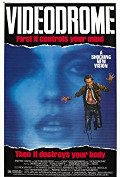
Directed by
David Cronenberg
90 minutes
Rated R
Reviewed by
Bernard Hemingway

Videodrome
A lot of people will struggle with Videodrome both morally and aesthetically. In both respects it is an uncomfortable film although its ideas are quite interesting and in many ways prophetic in our age of reality television.
James Woods plays Max Renn a cable TV programmer pandering to base tastes who becomes intrigued by snuff video show called Videodrome, apparently pirated from a satellite television station. He meets kinky radio talk show hostess Nicki Brand (Deborah Harry in her film debut) and together they get more involved in tracking down the makers of the show, who appear to be Professor Brian O’Blivion (Jack Creley) and his daughter Bianca (Sonja Smits) who run the Cathode Ray Mission, an shelter that provides television access to derelicts. Behind it however lurks evil and madness.
Yes, it’s a wacky story and perhaps because of that, the acting is often very self-conscious (although if anything Harry is remarkably at ease with her role as masochist). There are Cronenberg's characteristic oozing bodily fluids and man-machine morphings which for the squeamish are hard to watch and probably even more people will object to the misogyny and general tenor of moral decay.
Whilst not dismissing these considerations, the film, which Cronenberg also wrote, is of interest as a metaphor for the interplay between television and the viewer’s psyche. In this respect the director was some 20 years ahead of Michael Haneke. Those old enough to have been there will note that the videos use the Betamax format which eventually lost the tech wars to VHS and whilst the special effects by Rick Baker (who won the first Oscar in that category for An American Werewolf in London 1981).might have been quite state-of-the-art in their day they look decidedly clumsy now. This however is probably one of the ingredients that gives Videodrome its cult cachet – it’s both remarkably forward looking in its ideas and amusingly dated in its execution. Certainly not a combination with a general appeal but for cultists, pure gravy.
Want something different?





